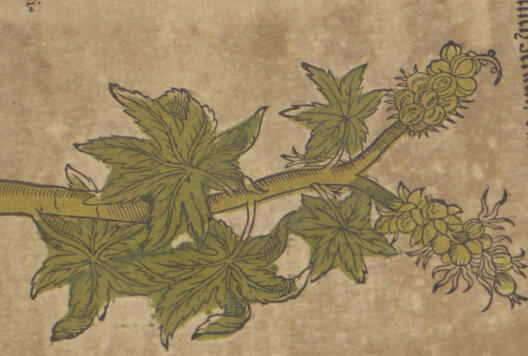

botanical background
order: Malpighiales
family: Euphorbiaceae
genus: rizinus (Ricinus)
species: castor bean (Ricinus communis)
attributes: annual in moderate climate zones, palmate leaves, one to four meters in height, in tropic regions perennial, between six and 13 meters
origin: probably in eastern Africa
habitat: all around the world in tropic and subtropic areas and warmer moderate regions, especially Mediterranean
in the Bible
And Jehovah said, You have had pity on the plant, for which you had not labored, nor made it grow, which was a son of a night, and perished the son of a night. 11 And should I not spare Nineveh, that great city, in which are more than a hundred and twenty thousand men who do not know between their right and their left hand, besides much cattle?
Jona 4, 5-11
If the Hebrew word קִיקָיוֹן (qîqâjôn) refers to the castor bean, cannot be definitely proven. Another mention of the word in the Talmud points at a remedy made out of the plant, which is identified as modern day castor bean oil.
Different Bible translations suggest divergent possibilities to mediate the word. In the Greek translation of the Old Testament called Septuaginta and the older Latin translations known as Vetus Latina the Hebrew word from the original text remained unchanged.
Luther on the other hand translated it in 1545 with pumpkin. The Luther Bible from 1984 reads forb, while the 2017 edition, the 2006 Elberfeld Bible and the 2007 Zürcher Bible have castor bean.
mentions: once
text passage: Jona 4, 5-11
Sources
Neumann-Gorsolke, Ute: Rizinus, in: Das wissenschaftliche Bibellexikon im Internet (März 2012), URL: https://www.bibelwissenschaft.de/wibilex/das-bibellexikon/lexikon/sachwort/anzeigen/details/rizinus/ch/a168715c7f2f62f1706e263eae96429f/ (abgerufen 22.05.2023).
Modern King James Version.





